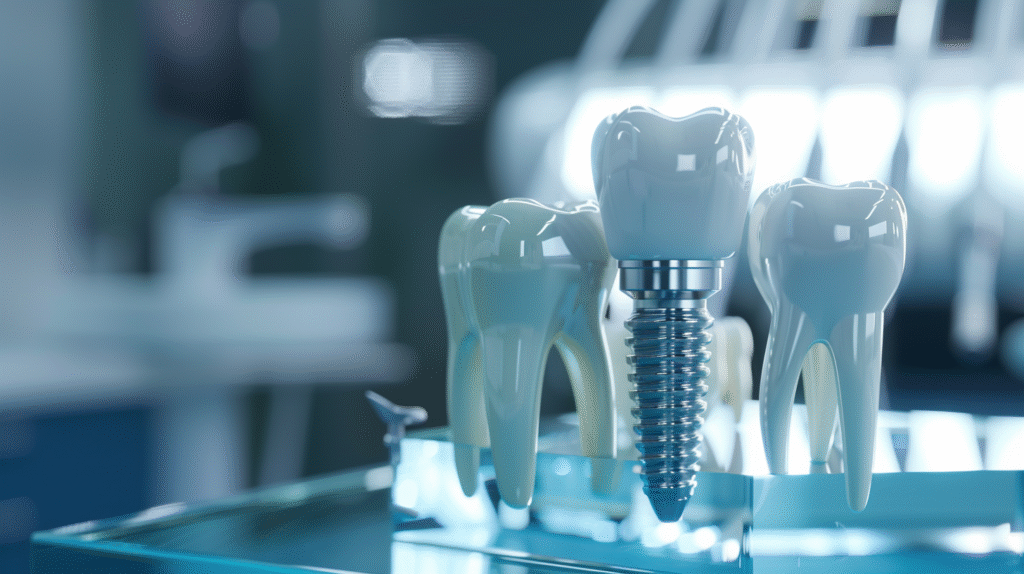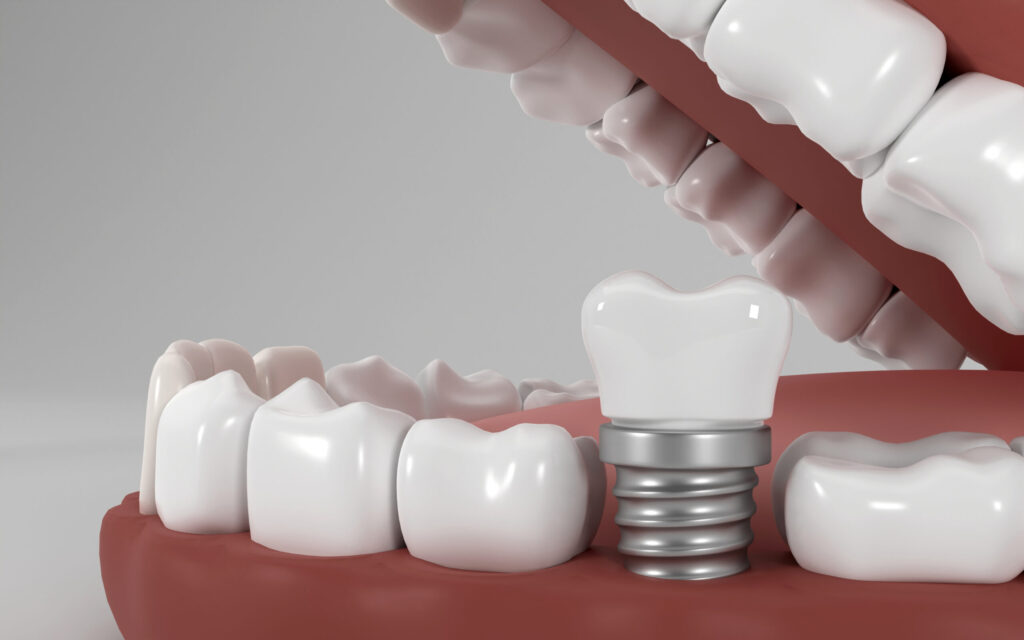Teeth implants are widely regarded as one of the most durable and effective solutions for replacing missing teeth. Unlike traditional bridges or dentures, implants are designed to fuse directly with the jawbone and provide a permanent foundation for artificial teeth. But a common question remains: How long do teeth implants last?
The answer depends on a mix of clinical, biological, and lifestyle factors. On average, dental implants last between 20 and 30 years, and many last a lifetime when properly cared for. This guide explains the key variables that determine implant lifespan and how patients can ensure long-term success.

What Will You Read?
What are dental implants and why are they long-lasting?
A dental implant is a biocompatible screw-like device, typically made of titanium or zirconium, that is surgically inserted into the jawbone. After a healing period, the implant integrates with the bone through a process called osseointegration. Once stable, a crown, bridge, or denture is attached to restore aesthetics and function.
Dental implants are considered long-lasting because:
- They do not rely on neighboring teeth for support
- They bond with the jawbone, mimicking natural roots
- They are resistant to decay and corrosion
- They maintain bone density, preventing facial collapse
These features make them superior to other tooth replacement options in terms of durability and stability.
What factors influence how long implants last?
Dental implant longevity is not guaranteed, but multiple factors can significantly affect how long they perform well. These include:
1. Implant material and brand
High-quality implants made by trusted manufacturers such as Straumann, Nobel Biocare, and Osstem are engineered for long-term performance. They offer:
- Superior design for bone integration
- Proven track records with clinical data
- Reliable surface textures that promote healing
- Structural durability over decades
Titanium remains the most commonly used material due to its strength and compatibility with human tissue. Zirconium is a rising alternative for patients seeking a metal-free solution.

2. Surgical skill and placement technique
Proper surgical placement is crucial. An experienced implantologist will:
- Evaluate bone density and oral health before surgery
- Use 3D imaging for precision
- Position the implant at the optimal angle and depth
- Ensure soft tissue health around the implant site
When implants are placed with precision, they are far more likely to last over 20 years.
3. Oral hygiene and aftercare
Once placed, implants must be maintained like natural teeth. Poor hygiene can lead to peri-implantitis, an inflammatory condition that causes bone loss around the implant.
Patients should:
- Brush and floss daily
- Avoid smoking
- Use antibacterial rinses if advised
- Visit the dentist every 6 months
- Treat gum issues early to prevent complications
Oral hygiene is the most critical patient-controlled factor in implant survival.
4. Health conditions and medication
Certain systemic conditions and medications can affect implant healing and long-term performance. Risk factors include:
- Uncontrolled diabetes
- Osteoporosis
- Cancer treatments
- Autoimmune diseases
- Drugs affecting bone metabolism (e.g., bisphosphonates)
Patients with these conditions should undergo thorough evaluations and tailored treatment plans.
How long do dental implants usually last?
The average lifespan of a dental implant depends on the patient’s habits and health status. Here is a general guideline:
| Patient Type | Expected Lifespan |
|---|---|
| Healthy, non-smoker with good hygiene | 25 to 30+ years |
| Moderate hygiene, mild health risks | 15 to 20 years |
| Poor hygiene or chronic disease | Less than 10 years |
| With lifetime care and maintenance | 30 to 40 years or more |
Many patients retain their implants for life without the need for replacement, especially when follow-up care is consistent.
Are crowns and abutments permanent too?
While the implant fixture (the screw in the bone) can last decades, the crown or prosthetic part may require replacement every 10 to 15 years due to:
- Normal wear and tear
- Changes in bite alignment
- Aesthetic updates over time
- Damage from grinding or trauma
Most clinics offer warranties or replacement programs for these components.
What can cause early implant failure?
Even with excellent treatment, implants can fail. Common reasons include:
- Peri-implantitis from poor hygiene
- Smoking or substance abuse
- Unaddressed bruxism (grinding teeth)
- Overloading the implant with excessive force
- Inadequate bone support due to osteoporosis or bone loss
Early detection of complications improves the chances of recovery or successful re-treatment.
Can dental implants last a lifetime?
Yes, dental implants can last a lifetime if all risk factors are controlled and the patient commits to lifelong care. Clinical studies show high survival rates even after 20 years, particularly when:
- Top-tier materials are used
- The surgery is done by an experienced professional
- Patients follow all aftercare recommendations
- Routine dental maintenance is maintained
It’s important to understand that implants are an investment in both health and lifestyle. Their success depends as much on the patient as on the clinic.
Summary and key takeaways
Dental implants are one of the most durable and natural-looking tooth replacement options available. While the implant fixture can last for decades or even a lifetime, crowns and abutments may need occasional replacement. Lifespan is largely determined by:
- Implant quality and surgical technique
- Daily oral hygiene habits
- Systemic health conditions
- Regular dental follow-up care
By making informed choices and practicing preventive care, patients can enjoy fully functional and aesthetically pleasing implants for the rest of their lives.

 Dijital Performans Ajansı.
Dijital Performans Ajansı.